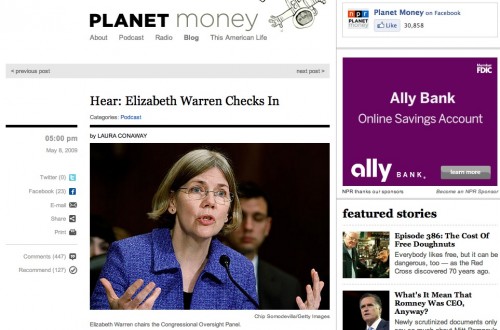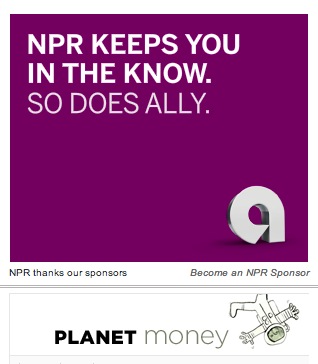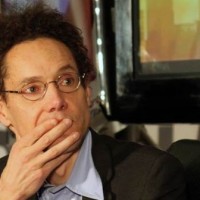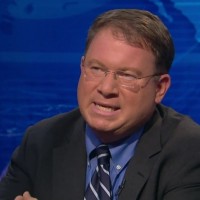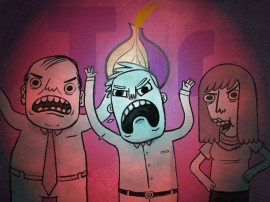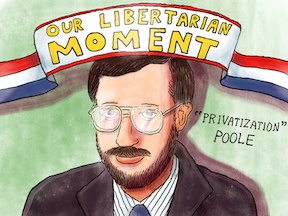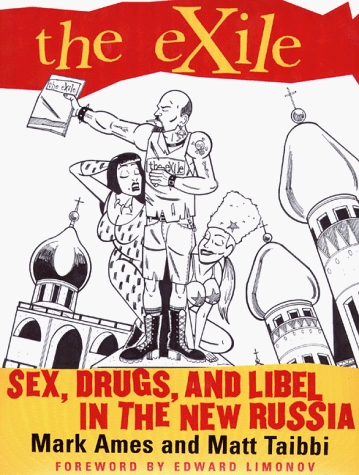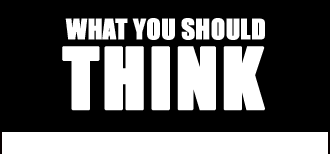The S.H.A.M.E. Project just released a brand new profile. Its latest subject: Adam Davidson, host of NPR’s popular business news program Planet Money and a columnist for the New York Times Magazine. Cruise over to S.H.A.M.E. or read it below.
And remember, we can’t keep exposing corrupt media figures and outing covert propagandists without ongoing support from readers like you. Do your part, contribute using PayPal or WePay…
Adam Davidson
Host of NPR’s Planet Money & New York Times Magazine Columnist

Adam Davidson graduated from the University of Chicago with a BA in religion, and began his public radio career selling airtime and doing sponsor outreach. He then became an on-air radio personality, filing pro-Iraq War dispatches as Marketplace’s Middle East correspondent, and recently transformed himself into an effective propagandist for the banking industry. Over the years, Davidson has whitewashed the occupation of Iraq, praised sweatshop labor, attacked the idea of regulating Wall Street and argued for “squeezing the middle class”–all while taking undisclosed money from banking interests. No wonder Davidson shamelessly credited Wall Street for providing “just about anything that makes you happy.”
The Recovered History of Adam Davidson
- Davidson began working in public radio in 1992, doing “underwriting sales” for Chicago Public Radio, a position described by one public radio station as “equivalent to that of a sales manager at private stations. This person must go out into the community and establish rapport with local businesses in order to sell airtime to them. The underwriting representative is then responsible for developing a direct . . . and informational message to put on the air for the client.”
- Adam Davidson spent the early 2000s as Middle East correspondent for Public Radio International’s Marketplace. In the lead up to the Iraq War, Davidson filed a number of pieces promoting the invasion of Iraq; after the invasion, Davidson moved to Baghdad and filed numerous radio items whitewashing the occupation catastrophe.
- In December 2002, Davidson positively profiled an Israeli right-wing conspiracy theory site Debka.com in order to promote the invasion of Iraq. Despite the fact that Debka.com was long ago discredited in Israel, where “not a single Israeli official…sees the site as a reliable source”–and despite Debka.com’s ties to rightwing conspiracy theory site WorldNet Daily, nevertheless Davidson presented Debka’s claims that Saddam had stockpiled weapons of mass destruction–including chemical, biological and nuclear–as credible. Davidson staked his own credibility defending Debka, telling NPR listeners: “There’s really no way to confirm what they’re reporting right now, but I’ve been reading the site for years, and it’s common to think they’re nuts, then to wait a few weeks and see the same information in The New York Times.” As it turned out, Saddam did not possess weapons of mass destructions of any kind. In 2007, Davidson’s beloved Debka.com created a panic in New York City after publishing false rumors of an impending Al Qaeda dirty bomb attack.
- In February 2003, just a few weeks before the U.S. invaded Iraq, Davidson found a couple of Iraqi merchants living in Jordan who were in favor of the coming invasion, telling Davidson’s listeners that the invasion would do wonders for Iraq’s economy. “Mohammed,” one of the merchants, told Davidson: “I’m very optimistic about the economy of Iraq.” The war decimated Iraq’s economy, destroyed its infrastructure and was responsible for hundreds of thousands of deaths.
- Davidson then moved to Baghdad and went to work whitewashing the brutality and violence of the war and occupation. In a 2004 Los Angeles Times op-ed, Adam Davison claimed that American military violence played no part in Iraqi anger at the occupation, and suggested that Americans hadn’t committed serious violence of any sort. Instead, Davidson argued that the reason the U.S. wasn’t winning the Hearts and Minds of the Iraqi people was because America had not successfully rooted out Saddam-era corruption. “It’s common to hear Iraqis say the U.S. regime is just like Hussein’s. At first, I found this bizarre. The U.S. is not hacking the ears off of innocent people. The U.S. isn’t massacring entire villages. But I learned that when Iraqis make the Hussein comparison, they’re talking, in large part, about corruption.” By focusing on Saddam-era corruption, Davidson made it seem as though the problem in Iraq was that Iraq wasn’t Americanized enough, rather than the violence of the American invasion and occupation.
- After living in Baghdad for a year, Davidson had to suddenly flee the country in 2004, fearing for his life after being accused of working for the CIA. Later, Davidson admitted that he had a tight and undisclosed relationship with occupation officials, who regularly visited his Baghdad home and revealed to Davidson that the situation was much worse than was being reported. Rather than telling his listeners as a journalist should, Davidson protected the occupation authorities: “The ones I liked I’d invite over to the house. I mean, I genuinely liked them, but also we’d get them a little drunk on wine. We’d tell them, hey, tonight everything’s off the record. And we’d get real information...we’d get these people over to our house, they’d have some wine, and they’d be like, ‘oh, it’s so much worse than you know.'”
- In 2006, now working at NPR as a business reporter, Davidson criticized the Sarbanes-Oxley Act, legislation passed in the wake of Enron to tighten corporate financial accountability and make top executives criminally liable for fraud happening under their watch. “The U.S. has a bunch of crazy rules that came out of a time of hysteria in the U.S. They don’t make any sense,” Davidson told listeners. This was part of a larger push by Wall Street and corporate interests to gut Sarbanes-Oxley. Among those pushing the same PR line against Sarbanes-Oxley as Davidson were Americans for Prosperity, Heritage Foundation and even Charles Koch himself. [ 1 ]
- In 2007, Davidson boosted for the Honduran sweatshop industry, and promoted sweatshop labor in general, which he said was a great opportunity offering women upward mobility. Making socks in a sweatshop is “the only way she can improve her life,” Davidson said of one Honduran young woman he profiled for NPR’s “All Things Considered.” He did not mention that Honduran sweatshop workers routinely develop incapacitating back and spinal injuries working 12-hour shifts with little or no breaks, face workplace abuse and intimidation, and earn about 65 cents per hour. Meanwhile the CEO of Gildan, a Canadian garment company doing business in Honduras that Davidson praised in his program, took home $11 million in compensation in 2009.
- In 2012, Davidson promoted an even more extreme version of the Honduran sweatshop: special extra-judicial sweatshop zones legally beyond Honduran constitutional and labor laws, where multinationals could tap cheap labor, and use their own police force and judicial systems. The extra-judicial business zones, the brainchild of University of Chicago-trained economist Paul Romer, have been denounced as “neo-colonial” and have attracted the interest of Milton Friedman’s libertarian grandson, Patri Friedman, along with other libertarians hostile to labor rights. Davidson dismissed critics of the Honduras extra-judicial sweatshop zones: “It’s easy to criticize experimenting with the livelihoods of the poor,” Davidson wrote. “We have to try some new things, probably many new things. And we have to accept that some of them won’t work.”
- In 2008, Davidson helped produce an episode of This American Life about the implosion of subprime lending that let Wall Street off the hook for its role in rampant mortgage fraud and predatory lending. “This was a crisis that was caused by willing participation of every single person. Nobody was coerced,” said Davidson’s co-producer Alex Blumberg. “And there was fraud. But that was not what caused the crisis. What caused the crisis was something bigger and more systemic that required the involvement of everybody at every step.” This evasion-by-exaggerating-the-complexity strategy is one that Davidson and Planet Money have deployed often to whitewash and deflect the role of criminality in the housing crisis. Among the show’s fans was Treasury Secretary and former New York Federal Reserve Bank chief Timothy Geithner: “Yeah, they did a good job.”
- In September 2008, Davidson falsely claimed that the repeal of the Glass-Steagall Act played no role whatsoever in the financial collapse: “Every economist I’ve spoken with says, simply, that it was a bad law but that it and its repeal are not really to blame for what is happening now.” Many key figures involved in Glass-Steagall’s repeal, including former Citigroup chief Sandy Weill, have contradicted Davidson’s false claim.
- In early 2009, NPR announced that Planet Money secured Ally Bank as the show’s exclusive sponsor. It was an unusual set up for NPR, as it meant that a financial institution was the sole funder of a news program about finance. At the time, Planet Money was the only NPR program underwritten by a single exclusive sponsor. Even Ad Age, the advertising industry’s trade publication, was surprised by the sponsorship arrangement and the “close alignment of message and news program.” (At the time of this writing, Ally is still Planet Money’s exclusive sponsor.)
- Ally Bank is a subsidiary of Ally Financial, formerly known as GMAC. The bank is one of the biggest mortgage servicers in the country, and has been one of the very worst offenders in foreclosure fraud and subprime fraud. It received more than $17 billion taxpayer bailout funds and has been investigated across the country for foreclosure fraud, robo-signing and student loan fraud. As of August 1, 2012, 74% of Ally Financial was still owned by the U.S. Government. [ 2 ]
- Planet Money’s relationship with Ally is a textbook example of “conflict of interest.” The bank had a clear and demonstrable interest in Planet Money’s coverage of the financial industry, especially issues that affected the bank’s bottom line. As Planet Money’s sole sponsor at a time when NPR funds were falling, Ally obviously wielded considerable power. Following months of complaints from readers pointing to the conflict-of-interest and the way Planet Money’s segments dovetailed with the banking lobby’s own propaganda, NPR’s Ombudsman was forced to look into the Ally-Planet Money relationship. The NPR Ombudsman ultimately dismissed listeners’ concerns as “cynical” and implied they did not know what they were talking about. Despite Davidson’s experience in public radio underwriting, he claimed ignorance about the nature of Planet Money’s arrangement with its sole sponsor, Ally Bank: “I have nothing to do with the underwriting stuff. We don’t pay any attention to the fact that they are a sponsor. We wouldn’t for a second give them any special treatment — positive or negative.”
- In 2009, while Ally Financial (then still known as GMAC) was spending hundreds of thousands of dollars lobbying against the Financial Consumer Protection Agency Act of 2009, Davidson aired a number of segments critical of the legislation. He questioned the need to regulate consumer financial products like mortgages and credit cards in order to protect people against bank fraud. “Will it work at all?” he wondered on air, and asked: “is this just one more layer of regulation in a regulatory system that fundamentally broke down?” [ 3 ]
- In May 2009, Davidson launched a bizarre personal attack while interviewing Elizabeth Warren, the chief architect of the financial consumer protection bill. Davidson surprised Warren and his own listeners with uncharacteristic personal smears, trying to portray her as a clueless, power-hungry ideologue: “The view that the American family, that you hold very powerfully, is fully under assault . . . that is not accepted broad wisdom. . . . I literally don’t know who else I can talk to support that view. I literally don’t know anyone other than you who has that view, and you are the person [snicker] who went to Congress to oversee it and you are presenting a very, very narrow view to the American people.” The Columbia Journalism Review described the interview as a “disaster” and “really cringeworthy stuff from Davidson,” who was so rude and unprofessional that NPR’s Ombudsman had to step in and apologize for his behavior. Davidson’s excuse: he had been traveling for a NPR fundraiser and was “very, very tired.” [ 4 ] [ 5 ]
- Listen to Davidson’s full interview with Warren here:
- Adam Davidson does not disclose that he does paid speaking gigs at events funded by banks and financial companies, including J.P. Morgan, Well Fargo, Bank of America and Goldman Sachs–the same companies he covers as a journalist. Davidson is frequently the only journalist/reporter booked to speak at these events; other speakers are usually work in finance. (See top of left sidebar for detailed info on Davidson’s recent speaking engagements.)
- In 2011, Davidson expanded his media presence with a weekly financial column in the New York Times Magazine. His first column argued that government can’t create jobs, and so politicians shouldn’t try to come up with “job plans”–a demonstrably false position that also happens to be shared by Koch-funded libertarian Cato Institute. In his second column, Davidson pushed for harsh austerity measures against the majority of Americans in order to benefit the financial sector: “It really stinks, but the only way to fix the economy is to squeeze the middle class.“
- In 2012, Davidson argued that everyone should grovel before Wall Street, without which, he argued, America would be much poorer. Davidson’s pro-Wall Street propaganda was so crude that even fellow neoliberal Matthew Yglesias stepped in to criticize Davidson: “I’m generally an Adam Davidson fan, but his recent New York Times Magazine article in defense of Wall Street is pretty unconvincing. The big problem is right up there in the lede where he says ‘Perhaps the best way to really appreciate what Wall Street does is to imagine life without it.'”
- On May 1 2012, Davidson published a flattering profile of Edward Conard, Mitt Romney’s former business partner at Bain Capital, as a way of promoting more worship of the rich: “Conard . . . has laid out tightly argued case for just how much consumers actually benefit from the wealthy,” Davidson wrote, as he uncritically reported Conard’s claim that inequality “is a sign that our economy is working. And if we had a little more of it, then everyone, particularly the 99 percent, would be better off.” Yves Smith, of Naked Capitalism, described the article as “chock full of blatant falsehoods” among which were Davidson’s claim that penicillin was made possible by investment capital from hedge fund managers like Conard. In fact penicillin research was funded by the British and U.S. governments.
- Two weeks later, on May 16, Davidson spoke at the 27th Annual Conference for the Treasury & Finance Professional. Bank of America, BlackRock, BNY Mellon, Bloomberg, Citibank, Fidelity Investments, Goldman Sachs, J.P. Morgan, Morgan Stanley, Well Fargo and about a dozen of the most powerful financial companies in the world sponsored the event.
Undisclosed Income
Adam Davidson’s career is currently being funded by bailed out banks. On top of Ally Bank’s exclusive sponsorship of Planet Money, Davidson receives lucrative speaking fees for appearing at events funded by the same banks and financial companies he covers as a journalist. Davidson has yet to disclose his corporate clients and how much they pay him, but here is a partial list of Davidson’s gigs from the last two years compiled from various publicly available sources:
- In April 2011, Davidson was the headlining speaker at the 9th Annual “Women’s World Banking” Microfinance and the Capital Markets Conference. The conference was hosted by J.P. Morgan, but the organization itself is funded by the world’s biggest banks and corporations, including BP, Morgan Stanley, Pfizer, Barclays Capital, VISA, ExxonMobil–just to name a few.
- In 2011, Davidson spoke at another microfinance conference, this once was also funded by Morgan Stanley, Citi, Bank of America, Deutsche Bank and CapitalOne.
- In 2012, Davidson spoke at the 27th Annual Conference for the Treasury & Finance Professional. Sponsors of the event included Bank of America, BlackRock, BNY Mellon, Bloomberg, Citibank, Findelity Investments, Goldman Sachs, J.P. Morgan, Morgan Stanley, Well Fargo and about a dozen of the most powerful financial the largest financial companies in the world.
Chicago Public Media, which co-owns “Planet Money” through its ownership of “This American Life”, explicitly bars conflicts-of-interest: “WBEZ journalists must uphold the trust of the public by not overlapping individual interests with professional responsibilities. WBEZ journalists may not accept any form of compensation from the individuals, institutions or organizations they cover.”
Note: Neither NPR nor This American Life have responded to S.H.A.M.E.’s requests for comment about Davidson’s conflicts of interest.
Planet Money’s Ally Problem
Ally Bank has been Planet Money’s exclusive sponsor since 2009, a relationship that provides a textbook example of conflict of interest. Below are two screenshots of Ally Bank advertisements running on Planet Money’s website:
Davidson’s Shame Quotes
I feel like the voice of business journalism is sort of, it’s an authoritative voice of God.
–Davidson in a 2009 interview with Nieman Journalism Lab
The last time I interacted with University of Chicago faculty in an extended way, they were my professors. Sitting on a stage as their ‘peer,’ I felt like a kid who had borrowed his dad’s suit.
–Davidson describes his reaction to being invited to talk about the “unintended consequences” of financial regulation at Chicago University’s 58th Annual Management Conference in April 2010
Raising [corporate taxes], or even maintaining them, might satisfy the anti-corporate angst of protesters and populists, but it won’t come anywhere near paying off our debt. Most people who study the issue agree that the top federal corporate tax rate (35 percent of profits) is simply too high. The cardinal rule of taxation is that whatever you put a levy on, you’ll inevitably get less of.
–Davidson’s “It’s Not Just About the Millionaires”; New York Times Magazine; November 2011
Davidson’s PR Strategies
Every economist I’ve spoken with says, simply, that it was a bad law but that it and its repeal are not really to blame for what is happening now.
–Davidson’s NPR segment “Can We Blame Or Praise Glass-Steagall?”
Most people who study the issue agree that the top federal corporate tax rate (35 percent of profits) is simply too high.
–Davidson on why U.S. should lower corporate taxes
I talk to a lot a lot a lot of left, right, center, neutral economists [and] you are the only person I’ve talked to in a year of covering this crisis who has a view that we have two equally acute crises: a financial crisis and a household debt crisis that is equally acute in the same kind of way.
–Davidson during his attack on Elizabeth Warren
Notes:
- Malcolm Gladwell made a similar claim in a 2007 New Yorker article that defended Enron. Read Gladwell’s S.H.A.M.E. Report for more info. [↩]
- See Naked Capitalism’s coverage of GMAC/Ally’s mortgage fraud. [↩]
- GMAC’s total lobbying on finance-related bills in 2009 added up to $1.2 mil. See GMAC’s page on OpenSecrets.org for more information. [↩]
- NPR did not respond to S.H.A.M.E.’s requests for comment about Davidson’s conflicts of interest. [↩]
- Read Corrente’s transcript of Davidson’s Elizabeth Warren interview. [↩]
August 7th, 2012 | Comments (29)



